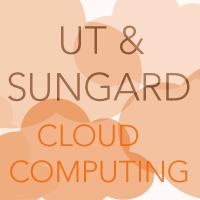
Every good partnership strengthens all the partners, and our new relationship with SunGard Availability Services is a perfect example. SunGard is a Fortune 500 company, founded in 1983 to provide software and IT services for the financial industry, higher education and the public sector. With this focus, it’s no surprise that SunGard is deeply invested in cloud computing, in which services are provided via the Internet from huge data centers that operate very efficiently due to economies of scale. However, cloud computing raises technical challenges, such as securing the services from cyber attack and guaranteeing the privacy of customers’ data. It also raises new opportunities, such as parallel processing across millions of cores.
To explore these challenges and opportunities, SunGard searched nationally for a university to partner with, and they wisely chose UTCS. Their decision was largely based on the strength of the department’s research in operating systems, computer networks, distributed computing and parallel processing. In part, our #8 national ranking in CS comes from building a powerhouse research group in these areas over two decades of concerted effort.
But, what attracts UTCS to partner with SunGard? First, companies offer the resources to build really large systems, and to deploy them in ways that collect meaningful data, which can be much more illuminating that building prototypes and running simulations. Second, SunGard understands the value of university research and appreciates the long-term nature of fundamental research. The company’s CTO, Dr. Indu Kodukula, is a Ph.D. graduate of Cornell’s computer science program, so he knows our culture well.
Our relationship with SunGard will be a true partnership. SunGard scientists and engineers will be embedded in our research teams, thanks to the opportunities created by the Bill & Melinda Gates Computer Science Complex, which opens December 2012. Still, this partnership could not have been established without the new willingness of the Office of Technology Commercialization – under the leadership of Dr. Richard Miller – to flexibly negotiate IP terms, royalties, and so on.
We plan to start small with two projects in the first year, then to gradually add additional projects. The first projects will focus on storage and hypervisors, critical components of a cloud-computing facility. Cloud storage allows high-performance access to vast amounts of data, and hypervisors allow multiple guest operating systems to run concurrently on a server, ensuring that these guests can share virtualized hardware resources while being isolated from each other. The goal of the Depot project, led by Professors Michael Walfish, Lorenzo Alvisi, and Michael Dahlin, is to build a cloud storage service that operates under minimal assumptions of trust. It is being designed to tolerate buggy behavior by servers, while providing safety and liveness guarantees to clients. The goal of Professor Keshav Pingali’s project is to find bottlenecks in the design and implementation of the current generation of hypervisors, and to eliminate the bottlenecks to permit them to scale to a large number of cores.



